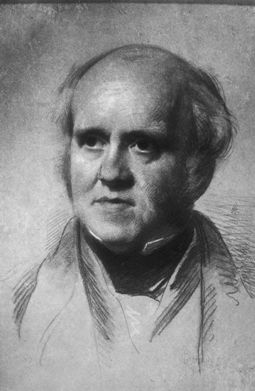
Ann Jones* reports the publication of a biography of a tireless reformer and geologist who witnessed the fiercest controversies of his day
Geoscientist 21.1 February 2011
Leonard Horner started a revolution in education; the quietly implacable factory inspector who laid the foundations for workers’ safety and tireless promoter of geological research who befriended some of the brightest stars of science of his day.
In the first full-length account of Horner’s life published November 2010, he emerges as one of the major figures in 19th Century educational and social reform. Author Patrick N O’Farrell (Professor Emeritus, Heriot-Watt University) studied the family archives of Horner’s great-great-great-grandson Lord Lyell, 3rd Baron of Kinnordy, as well as sources in the Geological Society of London, the National Archives and elsewhere to locate key first-hand accounts of Horner’s life and achievements.
Leonard Horner (1785 -1864) first made his mark in 1821 as co-founder and secretary of the Edinburgh School of Arts, the world’s first mechanics’ institute – forerunner of Heriot-Watt University. Intended to open doors to professional education, the Edinburgh School of Arts equipped its students to meet the changing needs of business, industry and society - an ethos still central to the University today.
After founding the elite Edinburgh Academy in 1825 he was headhunted to serve as the first (and only) Warden of London University in 1827. There, Horner’s reforming zeal enraged a powerful cabal of professors who claimed his scalp four years later in a ferocious row over who ruled the roost on the University Council. Horner’s determination was to serve him well in his greatest challenge. In 1833 he became one of the first Factory Inspectors, appointed to police the new Factory Act, designed to limit the working hours of children employed in mills, and ensure their right to education. Horner’s tenacious campaign for reform earned praise from both Tory peer Lord Ashley and Karl Marx.
Despite his daunting workload Horner pursued a life-long passion for geology. Born in the same year that James Hutton presented his Theory of the Earth to the Royal Society of Edinburgh, Horner studied geology at Edinburgh University and explored the formations on Arthur’s Seat that had inspired Hutton. Joining the Society in 1808 as one of its earliest Fellows, Horner twice served as President and curated the Society museum. Among his friends he numbered Sir Humphry Davy, Charles Lyell (who married Horner’s daughter Mary) and Charles Darwin, who was tipped to marry another of Horner’s daughters but was apparently put off by her formidable intelligence.
Horner was a keen supporter of the British Association for the Advancement of Science. Hosting breakfast at the Edinburgh meeting in 1834, his guests included Jean Louis Rodolphe Aggasiz, pioneer of glacial theory, William Buckland, two GSL Presidents and not least, Adam Sedgwick - founder of the Cambrian system, whose lively dispute with Murchison is also recounted in the book.
- Leonard Horner: pioneering reformer is published by Heriot-Watt University to mark the 40th anniversary of its Edinburgh campus. Copies £20 plus p&p from www.hw.ac.uk/shop.htm Blackwell Bookshop, Edinburgh Campus, or by order from any bookshop. ISBN 978-0-9566729-0-2.
* Archivist, Heriot-Watt University